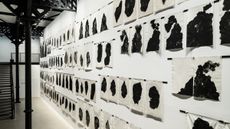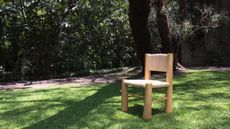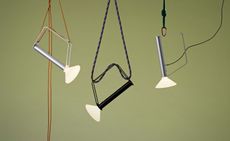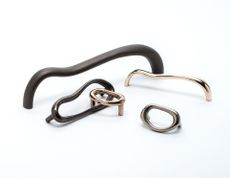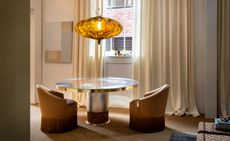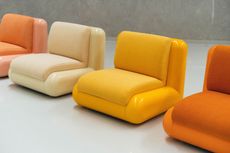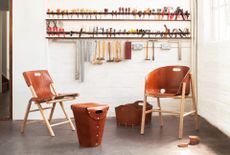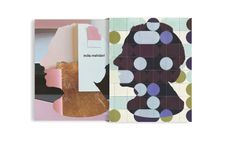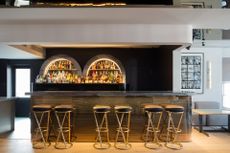How Industrial Facility creates a visual narrative of its unique design dialogue
- (opens in new tab)
- (opens in new tab)
- (opens in new tab)
- Sign up to our newsletter Newsletter
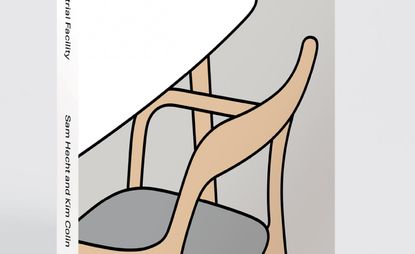
As with any artist or designer, producing a monograph can be quite gruelling,’ admits Sam Hecht, one half of quietly ubiquitous London studio Industrial Facility. ‘It’s because you endeavour to remove any gloss and layer of misinformation that creeps in over the years of working and present the work clearly.’
Hecht, who set up the studio in 2002 with architect Kim Colin, has just finished the mammoth task of compiling the studio’s first monograph – a 292-page tome published by Phaidon that documents the complete works of the world-renowned office. Together, over 16 years, Hecht and Colin have tackled almost every object under the broad umbrella of industrial design from chairs to hard drives to toilet brushes, for clients such as muni, Hitachi and Herman Miller.
Approaching the creation of the book as they would a project, Hecht and Colin assembled a dynamic team made up of graphic designers Graphic Thought Facility (GTF), photographer Angela Moore and critical writer Peter Kapos.

Tronco chair, for Mattiazzi, 2015.
They could sometimes see what we could not see, which was very key to the structure of the book,’ says Colin of the trio.
Over a three-year period Moore held around eight photoshoots to create a new photographic narrative for the book that Hecht and Colin say acts ‘like a film’, where each page is connected and sequenced. ‘So you may see a door-handle design from 20 years ago, and then the next page a sofa design with the door in the background because you’ve now entered the space of the room,’ explains Colin.
In his foreword, Alain de Botton praises the designers’ ‘vision of a dignified, ordinary life’ while various interviews with the studio’s friends and peers – Bruce Mau, Naoto Fukasawa and Deyan Sudjic are all included – provide a broader perspective.
‘A monograph is an opportunity to look back and make sense of it all,’ reflects Hecht. ‘There were many insights – often highlighted by Peter Kapos after extensive interviews with us. He noticed that our work is almost like one continuous project, even though each design is a different type, and for a different client. He also said we are less strategic and more constructive, whereby we often seem to involve or reference what is already there. He placed our thinking in a more cultural context.’
Having completed this mammoth task, the studio look forward to beginning a new chapter in their work where they want to think about not just the digital functions of connected products but also their presence in a way that no one else is considering. ‘As with all things, we’d like to balance our desire to live comfortably with our ambition to live with things more simply,’ concluded Colin. ‘It’s an exciting time for design.’

Installation view of ‘Beauty as Unfinished Business’ at Biennale Internationale Design, Saint-Étienne, France, 2015.

‘Dalston’ pendant lamp, for Wästberg, 2015.

‘Wireframe’ sofa for Herman Miller, 2011.

Left, ‘Bell’ alarm clock for Takumi,, 2008. Right, ‘Radice’ stools, for Mattiazzi, 2013.

‘Busby’ lamp, for Wästberg, 2013
INFORMATION
Industrial Facility, £59.95, published by Phaidon (opens in new tab). For more information, visit the Industrial Facility website (opens in new tab)
-
 34th São Paulo Bienal arrives at Luma Arles for first European presentation
34th São Paulo Bienal arrives at Luma Arles for first European presentationAn exhibition of highlights from the 34th São Paulo Bienal is at Luma Arles, marking its European and tour finale
By Martha Elliott • Published
-
 This winter’s most stylish skiwear, Gucci to Hermès
This winter’s most stylish skiwear, Gucci to HermèsStatement-making skiwear for on and off the slopes, from Louis Vuitton, Dior, Moncler and more
By Jack Moss • Published
-
 Clásicos Mexicanos celebrates Mexican design’s golden age
Clásicos Mexicanos celebrates Mexican design’s golden ageDesign Miami 2022: the Maestro Dobel Artpothecary in collaboration with Clásicos Mexicanos features works from Mexican architect Ricardo Legorreta’s ‘Vallarta’ collection
By Sujata Burman • Published
-
 Portable lights to illuminate your winter nights
Portable lights to illuminate your winter nightsThe best portable lights and where to buy them: brighten up your winter evenings with this edit of portable lamps for your desk, garden and more
By Rosa Bertoli • Published
-
 Interior design books championing shelf love
Interior design books championing shelf loveWelcome to the Wallpaper* guide of the best interior design books published in 2022 and beyond – a collection of riveting visual tomes to feed creative innovation, inspiration and imagination
By Rosa Bertoli • Published
-
 Door handles and knobs: latest designs for quick home updates
Door handles and knobs: latest designs for quick home updatesDoor handles and beyond: open the door to a world of practical design details and ideas for door furniture with our selection of architectural ironmongery from some of the world's leading designers and makers
By Rosa Bertoli • Published
-
 Dimoremilano opens immersive Marylebone residency around Frieze London 2022
Dimoremilano opens immersive Marylebone residency around Frieze London 2022Coinciding with this year’s Frieze London, Dimoremilano has opened an immersive residency at The Invisible Collection’s new Marylebone HQ
By Mary Cleary • Last updated
-
 Holloway Li’s debut furniture collection is like colourful candy
Holloway Li’s debut furniture collection is like colourful candyHolloway Li presents the ‘T4’ collection of furniture, created in collaboration with Turkish manufacturer Uma and inspired by the designers’ 1990s childhood
By Rosa Bertoli • Last updated
-
 Bill Amberg creates leather furniture in collaboration with the Knepp Estate
Bill Amberg creates leather furniture in collaboration with the Knepp EstateLondon-based designer Bill Amberg has created a series of furniture pieces for the Knepp Estate, Sussex, using leather from the rewilding project's animals for an on-site cafe due to open in 2023
By Giovanna Dunmall • Last updated
-
 India Mahdavi monograph reveals a life in full colour
India Mahdavi monograph reveals a life in full colourAn ode to the power of colour, India Mahdavi’s first monograph shines the spotlight on the designer’s trendsetting interiors and signature pieces
By Léa Teuscher • Last updated
-
 London’s Groucho Club gets a facelift
London’s Groucho Club gets a faceliftTransit Studio leads the makeover of London’s Groucho Club – its series of new, refurbished rooms are part of the Soho legend’s ongoing modernisation plans
By Ellie Stathaki • Last updated
